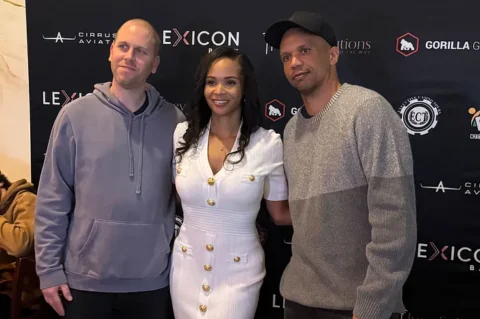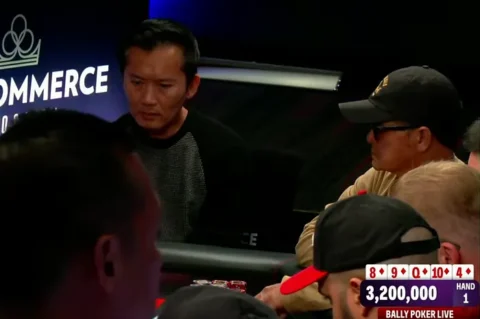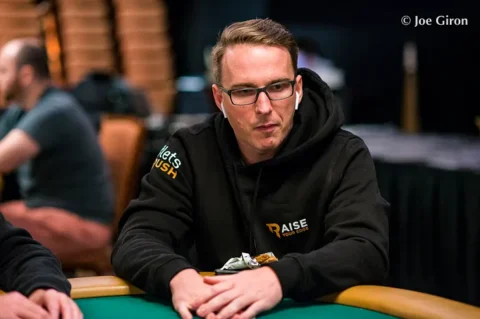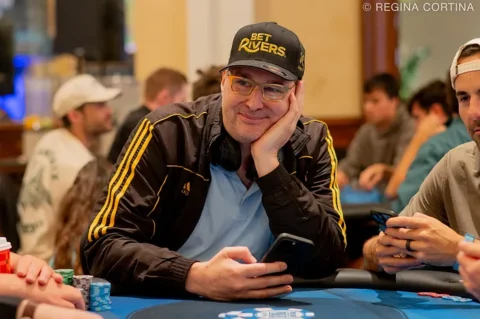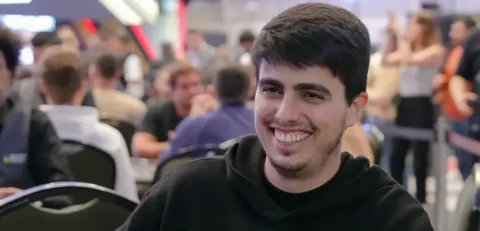Scott Bartlett, 35, from Southampton, UK, has recently found himself at a crossroads in life. After spending over a decade working in the financial industry, Scott has turned his focus to something vastly different: poker. His current transition from a career in risk management to becoming a full-time professional poker player marks an exciting and uncertain new chapter in his life. During a conversation with Scott at the 888poker-powered UK Poker League (UKPL) event at the Grosvenor Casino Reading South, he shared his thoughts on this journey and what lies ahead.

A Corporate Life Left Behind
For 12 years, Scott built a career in finance, working primarily in risk management for major firms in Canary Wharf and the City of London. Armed with a degree in Business and Financial Management from Staffordshire University, for over a decade he spent his days navigating the intricacies of corporate risk. Alongside his professional success, in his spare time Scott was always drawn to poker.
“I’ve been playing poker since my university days,” Scott recalls. “Back then, it was just fun £5 buy-in games with friends.” Over time, however, poker became more than just a hobby—it turned into a serious passion. While juggling a demanding corporate job, Scott consistently found himself a winner as a semi-professional player, with his poker time away from work netting him decent profits.
Scott Forges a New Path: From Corporate to Creative
Having recently left his corporate job, Scott is now exploring poker as a full-time pursuit. But it’s not just about the cards. “I’ve been pigeonholed into one role for my entire career, and now I’m looking for more creative outlets,” Scott explains. He is considering various possibilities—stand-up comedy, poker vlogging, video editing—essentially anything that allows him to express himself creatively.
While poker offers an obvious outlet for his analytical skills, Scott is drawn to other pursuits as well. “I’ve always enjoyed telling stories and creating content, so I might give poker vlogging a shot,” he says. It’s a bold departure from the structured, predictable world of finance, but Scott is excited by the opportunity to chart a new course.
Poker: A Natural Fit for Scott’s Skill Set
The transition from finance to poker might seem like a leap, but for Scott, it’s a natural progression. “Poker represents a blend of all the things I’m good at—math, competition, and making informed decisions under pressure,” he explains. His background in risk management has honed his ability to assess information quickly and make calculated decisions, skills that translate directly to the poker table.
Now that Scott is managing his own financial risk—juggling property investments, rent, and bills—he finds a unique parallel with poker. “It’s all about risk vs. reward. I’m constantly calculating the potential return on investment, whether it’s with my property or on the felt,” Scott says. His approach to poker mirrors his approach to finance: disciplined, strategic, and focused on long-term gains.
A Preference for Live Poker Over Online Poker
While Scott once played a significant amount of online poker, the multi-tabling grind no longer appeals to him. “I used to work with 4-6 monitors in my finance job, and the idea of doing the same thing for online poker was just too much,” he admits. Although he hasn’t ruled out a return to online poker in the future, his focus right now is on live games.
Scott’s primary form of poker study comes not from reading poker books or being enrolled in a poker training site, but rather from watching live poker streams on YouTube. He focuses on behavioral patterns and spotting tells, which he then integrates into his own gameplay at the live poker felt.
He follows a general betting strategy, focusing on playing specific pots and exercising pot control. While he hasn’t worked extensively with solvers himself, he’s watched numerous videos where top players use them. Though his approach is largely intuitive, observing how other players incorporate solver use and inputs has helped improve his overall game.
Cash Games vs. Tournaments: The Battle Continues
For much of Scott’s poker career, cash games have been his bread and butter. “I’ve been very profitable in cash games,” he says, though his experiences in tournaments have been less successful. “I’ve tried to take shots in tournaments, to ‘punt and bink,’ but I haven’t really seen much success. I’ve had some tough luck.”
Despite these tournament struggles, Scott remains committed to giving them another shot. “Tournaments have the potential to deliver big scores relatively quickly, and I’m always thinking about the risk/reward dynamic,” he explains. With this mindset, Scott traveled an hour north from his home to enter the UKPL Reading South festival, hoping to satellite his way into the £560 888poker Main Event. While he acknowledges that his bankroll might be better spent on cash games, he’s willing to take calculated risks for a shot at bigger payouts.
Scott was one of 29 total entries into a £90 cashout satellite. While he made it into the money, Scott fell agonizingly short of winning himself a seat into the Main Event, finishing an ever-so-close 4th place for £162 (3rd place would’ve netted him the £560 needed for the seat).

The Road Ahead: Traveling and Expanding His Horizons
Living in Southampton limits Scott’s access to poker action. His local game is typically a £1/1, although it can sometimes escalate to a £1/2/5 depending on the players and the dynamics at the table. On a good night, he might sit down with £300 and cash out for four to five times that amount. But when the action dries up, Scott turns to London, where the Hippodrome Casino is able to offer him the higher stakes £2/5 games he prefers.
Looking beyond the UK, Scott has his sights set on international poker destinations. In the coming months, he’s thinking about taking trips to Poland, Macau, and Vietnam, all with the intent of playing poker while soaking in different cultures and experiences. His recent three-week trip to Las Vegas—where he played 10-20 hours a day—has only fueled his desire to explore new poker landscapes. Having binked a tournament for the first time—an Aria daily—certainly didn’t hurt his confidence much either!
On Saturday, May 25th it was Scott Bartlett (United Kingdom 🇬🇧) beating out a field of 63 entries and claiming top prize in our $240 NLH Tournament!
The win came with a payday of $2,987 from the over $12K prize pool!
Congrats Scott! pic.twitter.com/65ua0CYSk6
— ARIA Poker (@ARIAPoker) May 28, 2024
The Poker Grind and Managing Risk
As Scott continues to transition into professional poker, he’s keenly aware of the need to manage his risk. “In the past, as a semi-pro, I could afford to be more reckless with my winnings,” he reflects. “I never had a year where I lost more than £10,000. Most years I’d win somewhere between £3,000-£6,000, but in my best year I made £18,000. If I won £5,000, I’d take a shot at higher stakes because I didn’t need that money for expenses,” he continued. “But now, as a full-time pro, that £5,000 has to cover a month’s worth of living costs and expenses.”
Critically, the shift to full-time poker over the last few months has required Scott to approach the game with far more discipline. He’s eager to take shots in higher stakes cash games, but he’s also focused on minimizing risk and ensuring that his bankroll is carefully managed. “It’s all about building slowly and taking calculated risks,” he says.
Conclusion: Taking the Shot
Scott Bartlett’s transition from finance to poker is a leap of faith, but it’s a journey that he’s approaching with careful thought and strategic planning. For Scott, poker isn’t just a game—it’s a way to manage risk, challenge himself, and build a sustainable future. While he knows the road ahead will be filled with highs and lows, now in his mid-thirties, Scott feels the time is ripe to give it his all.
“I’ve got to give it a go now,” he says. “If I can just manage my expenses and liabilities well while playing poker, I might be able to spend the rest of my life in a sort of ‘semi-retirement. That’s really the goal.’”
Wrapping up our conversation, I asked Scott to envision and imagine an ideal scenario, in which he’d win himself a satellite seat to the 888poker Main Event here at the UKPL Reading South Festival, then parlay that success to a final table appearance, where he’d notch a nifty four- or five-figure score. I asked him what such a score would mean to him.
His response was enlightening and instructive, “it just enables me to manage my risk that much better. Basically it buys time. When you win at poker, you gain a day’s work or a week’s work. And the same is true when you lose a buy-in; you lose time, you owe a week. Poker is sort of like a lifetime thing; ideally I never want to have to be in a situation again where I go bust and I’m forced to go back and get a real job.”
As Scott looks ahead to upcoming tournaments and potential international poker adventures, one thing is clear: he’s all in.

